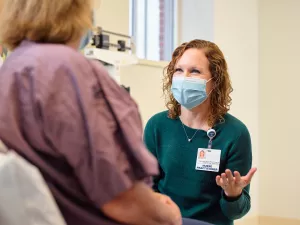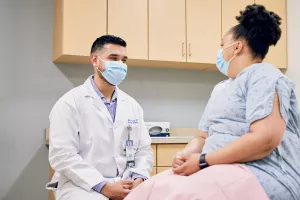Obstetrics and gynecology (also known as OBGYN) is a medical specialty that looks after the female reproductive system, including the ovaries, uterus and fallopian tubes. From performing routine wellness visits to diagnosing and treating more complex conditions, we care for women and assigned females at birth (AFABs) at all stages of life.
A lifelong partner for health
Women and AFABs have unique healthcare needs that often change over time. That’s why we'll be by your side as you reach some of life’s most precious and life-changing milestones — from infancy and puberty to family planning, menopause and beyond.
Along the way, you can count on us to care for your day-to-day reproductive needs, like birth control services, along with treating more complex conditions such as pelvic floor disorders and gynecologic cancers. So wherever your path to wellness leads you, you can trust that our OBGYNs will guide you through important changes to your reproductive system.

OBGYN care near you
Our labor and delivery and maternity team is composed of experts in high-risk obstetrics who provide individualized attention at every stage of your birthing journey. We offer a complete range of specialized pregnancy services, including pain management and our Level IIB Special Care Nursery for premature infants or those with special needs.
In addition, the LGH main campus emergency department has an Obstetric Emergency Department (OB ED) that is always ready to provide lifesaving care to pregnant or postpartum women experiencing a medical emergency.
Whether you’re planning a pregnancy, treating pelvic pain or managing menopause, our highly skilled OBGYN team is here to keep you active and well at every stage of life. We offer the latest in minimally invasive robotic gynecological surgery right here in our community and are proud to offer you and your family a warm, caring and calming childbirth environment.
If you're having a baby, our labor and delivery team members are here for you. With the newest labor and delivery suites in the area, we'll welcome your baby with a sweet lullaby. You can also take comfort in knowing that a special care nursery is on-site with Tufts Medical Center neonatologists to take care of your newborn when they need a little extra support.
Your OBGYN team should be there for you throughout your life, no matter what comes your way. We have team of specialists in clinics around the region and offer the highest level of specialist and subspecialist care at TMC. Whether it is the most complex gynecologic surgery, including minimally invasive techniques, or reproductive challenges, our clinical teams are here to support you.
Conditions
We treat the full range of OBGYN conditions, including:
Testing
Your primary care doctor will review your personal and family health history to better suggest age-appropriate tests that track your gynecologic health. Health screenings are an important part of preventive care because they can check for conditions and diseases before any signs or symptoms surface.
Talk with your doctor to learn which of these health screenings are right for you:
- Breast exams
- Cervical biopsies
- Colposcopy
- Cervical cancer pap tests
- Endometrial biopsy
- Laboratory services
- LEEPs/LEETZ
- Mammography
- Pap tests
- Physical exam
- Ultrasound
- Vulvoscopy
Depending on the results of these exams, your doctor may recommend additional testing.
Fertility testing
Infertility affects all people equally. That’s why it’s so important to be in tune with your health, as well as your partner’s. We provide initial fertility testing for all involved partners so we can understand the cause of infertility and how to navigate it. These tests include:
- Blood testing
- Hysterosalpingogram (HSG)
- Semen analysis
- Sonohystogram
- Ultrasound
- X-ray
When you're ready to pursue fertility treatment, we'll be by your side. We can help connect you with a fertility specialist from Boston IVF, who'll create a customized plan suited to your body and its unique needs.
Genetic counseling
Preconception and prenatal counseling empowers people to better understand their genetics so they can make more informed family planning decisions. Standard prenatal screenings already look for Down syndrome.
Meanwhile, deciding to move forward with genetic testing can provide even more important information about your baby's health, like if it's a carrier for cystic fibrosis, sickle cell anemia and more.
Your OBGYN may recommend additional testing if:
- You're having trouble getting pregnant or have had multiple miscarriages.
- You have a family history of a specific genetic condition.
- You have an ethnic background (e.g. Jewish, African American, French Canadian) in which some genetic diseases are more prevalent.
- Your OBGYN has determined the baby is at risk for a genetic syndrome.
High-risk pregnancy
We perform the following tests throughout a high-risk pregnancy to screen your health as well as the baby's health:
- Amniocentesis
- Chorionic villus sampling
- Preconception and prenatal genetic counseling
- Fetal blood sampling
- Nuchal translucency screening
- Prenatal diagnostic ultrasound
- Routine and targeted sonographic examination
Treatments
Once we’ve diagnosed your gynecologic condition or have a better understanding of the type of care you’ll need, we’ll design a treatment path that’s uniquely you. We may recommend treatments ranging from lifestyle changes to medication to surgery.
And because we challenge a one-size-fits-all approach to health care, we've expanded our OBGYN services to better align with the cultural customs and languages of our diverse community.
Our physicians are fluent in a variety of languages — like Mandarin, Cantonese and English — so more people can feel confident in how we communicate and respect cultural nuances.
We believe so strongly in in our approach to OBGYN care for Asian persons that many of our own Asian care team members trust their health and family plans with Tufts Medicine.
By taking the lead on your body and family planning goals early, you can make the best possible choices for your health today and in the future. We support all kinds of individuals and couples pursuing family planning, including
- People waiting to grow their families
- People who are in need of perinatal care (miscarriages and abortions)
- People who are trying to conceive
- People who feel their family is complete
- People who want to live a childfree life
Did you know that 1 in 6 people struggle to conceive naturally? Together with our partners at Boston IVF, we offer the following fertility treatments to help people fulfill their family-building dreams:
- Egg freezing
- Intrauterine insemination (IUI)
- In vitro fertilization (IVF)
- LGBTQIA+ family building
- Ovulation induction
- Third-party reproduction, including donor egg, embryo and sperm
- Timed intercourse
Gynecologic oncology is a medical specialty that treats cancers affecting the female reproductive system, including the:
- Cervix
- Fallopian tubes
- Ovaries
- Uterus
- Vagina
- Vulva
When your care needs are anything but average, we’re here to over-deliver with the latest treatments available, like robotic-assisted surgery and intraperitoneal chemotherapy.
Sometimes surgery is necessary to get your reproductive health back on track. We offer the latest minimally invasive and robotic surgery techniques to reduce your recovery time and discomfort.
Turn to Tufts Medicine when you need any of the following surgeries:
|
|
Our maternal fetal medicine care team pays special attention to people with high-risk pregnancies, which are pregnancies with an increased chance of complications for the pregnant person, the baby or both.
Your health is personal, and we believe your care should be, too. So whether you identify as lesbian, gay, bisexual, transgender or other, we're committed to making healthcare work better for you. We offer inclusive OBGYN care for LGBTQIA+ persons with services like:
- Gender-affirming surgeries
- Hormone therapy and monitoring
- LGBTQIA+ fertility services
- Trans-affirming gynecological care, including cervical cancer screening and pelvic exams
Accessing gynecologic care for the first time is a big, and sometimes nervous, moment in a young person’s life. Our pediatric and adolescent gynecologists provide infants, children, teens and young adults the care they need as their bodies change.
If you think of your body as a house, the pelvis is its foundation. It provides a sturdy base to support the organs and muscles in your lower abdomen area. From giving birth to simply aging, a weakened pelvic area can make natural bodily functions feel like a greater chore for your abdominal core.
We’ll be here for you every step of the way, from your first pelvic-related symptoms and screenings through to treatments and ongoing care.
If you and your family have learned that a pregnancy or newborn has a poor prognosis, our perinatal palliative care team will be here to care for every part of you — physically, mentally and emotionally. We offer peer support groups and counseling so that people feeling similar pain can heal together.
Deciding where to have your baby and the OBGYN to join you along your pregnancy journey are important choices. We want to make that decision easier for parents-to-be with our state-of-the-art pregnancy care in an environment that feels like home. We’ll work together to create a pregnancy health plan that’s uniquely you, from conception to delivery and beyond.
Urogynecology is a medical specialty that cares for women and AFABs living with conditions that affect the vagina, uterus, bladder and pelvic organs. If you need surgery to treat conditions like stress urinary incontinence or pelvic organ prolapse, we’ll connect you with our urogynecology team.

From regular office visits to inpatient stays, find the healthcare you need and deserve close to home.

Meet the doctors and care team devoted to supporting you every step of the way along your path to better health.